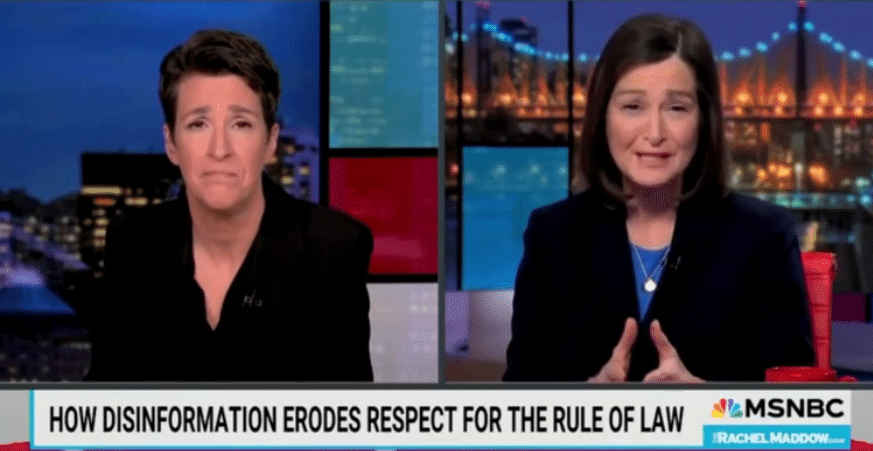We have been discussing the alarming shift in higher education in favor of censorship and speech regulations. These voices have been amplified on media platforms like MSNBC which has championed efforts to censor people and groups on social media and other forums. The most recent example is the interview of University of Michigan Law Professor and MSNBC legal analyst Barbara McQuade by Rachel Maddow. In the interview, McQuade explains how the First Amendment is the “Achilles Heel” of the United States and why the public needs to embrace greater limitations on free speech.
Professor McQuade has published a book entitled Attack from Within: How Disinformation is Sabotaging America. Despite my strong disagreements with her views on free speech, I am sure that it will be an important contribution to this debate. My forthcoming book, The Indispensable Right: Free Speech in the Age of Rage, takes a diametrically opposed view on the meaning and history of free speech in America.
In the interview, McQuade recognizes the importance of free speech while emphasizing its dangers.
“Actually, Rachel, I think we’re more susceptible to it than other countries, and that’s because some of our greatest strengths can also be our Achilles Heel. So, for example, our deep commitment to free speech in our First Amendment. It is a cherished right. It’s an important right in democracy, and nobody wants to get rid of it, but it makes us vulnerable to claims [that] anything we want to do related to speech is censorship.”
Well, the question is what “we want to do related to speech.” If it involves blacklisting, throttling, deplatforming, and bans, it most certainly does raise questions of censorship. Free speech is now portrayed as an existential threat to the country as opposed to the very thing that defines us as a free people.
McQuade captures the theoretical divide over free speech, though she is clearly voicing a view that is increasingly popular among law professors. She advances views of free speech that I have discussed in prior academic writings and the new book as “functionalist.” These views allow for greater trade offs between free speech and overriding social or political priorities.
For some of us, free speech is a human right. In that sense, I am undeniably a free speech dinosaur who believes that the solution for bad speech is better speech. Rather than continue down the slippery slope of censorship under the guise of disinformation, we can allow citizens to reach their own conclusions in an open and robust debate.
The alternative is often to use transparently biased judgments over what is “misinformation, disinformation, and malinformation” (MDM). The government has used this rationale to coordinate censorship in what it has called the “MDM space.”
For example, within DHS, Jen Easterly, who heads the Cybersecurity and Infrastructure Security Agency, extended her agency’s mandate over critical infrastructure to include “our cognitive infrastructure.” The resulting censorship efforts included combating “malinformation” – described as information “based on fact, but used out of context to mislead, harm, or manipulate.” I testified earlier on this effort.
McQuade’s book will certainly add to the scholarship in this area. However, her view is painfully familiar for many of us in academia.
Reprinted with permission from JonathanTurley.org.


